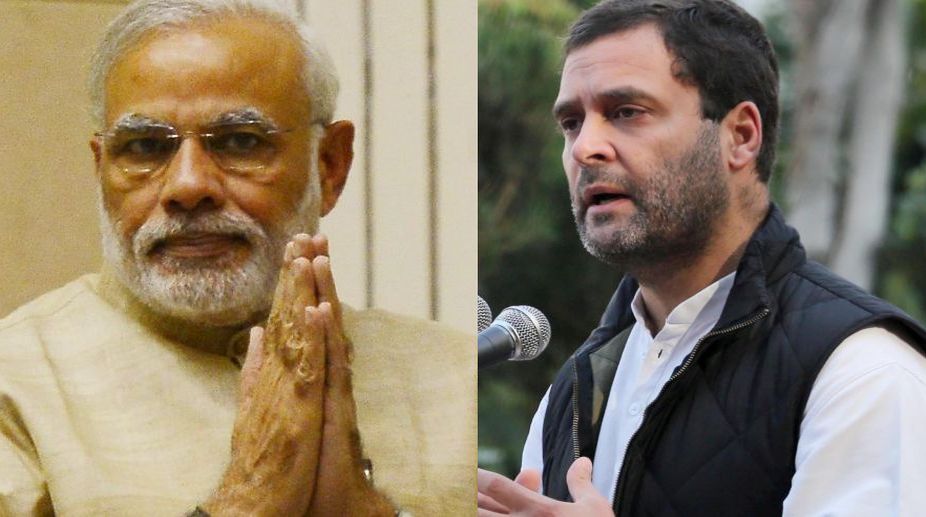Rahul accuses PM Modi of running a school of corruption
The Congress MP alleged that the prime minister is teaching each chapter in detail including ‘donation business under the subject Entire Corruption Science.

Prime Minister Narendra Modi and Congress Party president Rahul Gandhi (Photo: Facebook)
Rahul Gandhi’s 59-day sabbatical in FebruaryApril 2015 did not make any difference to his persona. He remained what his detractors in the social media called him, viz. Pappu or an adolescent who cannot be taken seriously. That the Congress vice-president is aware of this unflattering assessment became clear during his recent interactions with the students and academics of the University of California at Berkeley when he said that he has been called a reluctant politician and even stupid.
As his speech and exchanges with the interlocutors showed, he has shed much of his earlier immature image and emerged as someone composed and capable with clear-cut ideas about what has gone wrong with the present government and what brought down its predecessor. Despite the clarity, not all his opinions were unexceptionable.
For instance, his view that India can progress only by developing small and medium industries and not by building large factories like China puts an unwarranted limit on the country’s industrial development.
Advertisement
Similarly, his charge against the Manmohan Singh government that it had become arrogant towards the end of its tenure, which led to its fall in 2014, was rather odd, considering that there was nothing for the government to become arrogant about when it was mired in numerous corruption scandals. If Rahul meant that the haughtiness was due to the perception that the government thought that it faced no challenger in 2011-12 since Narendra Modi was nowhere in the picture at the time, he should have said so.
Otherwise, his charge is inexplicable, unless he is blaming his mother, Sonia Gandhi ~ the putative power behind the throne ~ for the hauteur. Notwithstanding these rather curious observations, Rahul came through as someone who was not unwilling to take the controversial question of dynasties in Indian politics without flinching.
There is much to be said for his view that this is how India works even if it is not something to be proud of. For instance, dynasties are a part of not only politics, but can also be seen in the film world ~ he mentioned the case of Amitabh Bachchan’s son, Abhishek (whose wife Aishwariya is also in films), and the legal and business professions. Outside India, too, there are the Clintons and the George Bushes in America and the Bhuttos in Pakistan.
But what was most noticeable was Rahul’s acknowledgement that Modi was a better communicator and that the PM had some good ideas like the “make in India” projects, which Rahul wished that Manmohan Singh had also taken up. Equally noteworthy was his willingness to be the prime ministerial candidate in 2019 ~ if his party wanted ~ which is the first time that he has shed the stamp of being a part-timer.
What this announcement means is that there is now a distinct possibility of a Modi vs Rahul confrontation in the next general election whether it is two years from now or if it is brought forward by a year which is apparently what the BJP wants. Going by Rahul’s performance during the two weeks which he spent in the US, the BJP will no longer be delighted over the prospect of the Great Communicator taking on the hesitant crown prince.
There are two reasons for the BJP to be wary. One is that Rahul is no longer just a shrill critic of everything that the BJP does. Instead, he is now much calmer and willing to take a balanced view of the political and economic scene. But the more worrying reason for the BJP is that the party and the government are concerned not only about the deteriorating economic situation, but also the resultant social distress.
While Modi can brush off the criticism of former BJP ministers like Yashwant Sinha and Arun Shourie as being the grouses of frustrated old men, he cannot ignore what the RSS chief, Mohan Bhagwat, has said about the agrarian woes and the problems faced by small and medium business enterprises because of the messy rollout of the Goods and Services Tax (GST).
The condition of these core supporters of the BJP belonging to the middle class has been adversely affected not only by the GST but also by the fact that the tax burden has followed the hugely disruptive exercise of demonetization, which the government probably now realizes was a case of monumental misjudgment, as Manmohan Singh said.
Rahul can be said to have come of age at the right time when he is in a position to exploit the government’s many difficulties, ranging from its failure to address the unemployment problem to the emotive issue of farmers’ suicides to the disenchantment of students which can be seen in the defeats suffered by the Akhil Bharatiya Vidyarthi Parishad (ABVP), the BJP’s student wing, in various student union elections.
There is little doubt that the mood in the country has changed from the time when Bihar chief minister Nitish Kumar, the BJP’s latest friend, said that Modi faced no challenge.
Even if Rahul still has some distance to go before he can be accepted all over the country as the best alternative to the present dispensation while the Congress galvanizes its organizational structure, the next election is unlikely to be a cakewalk for Modi and BJP.
(The writer is a former Assistant Editor, The Statesman)
Advertisement